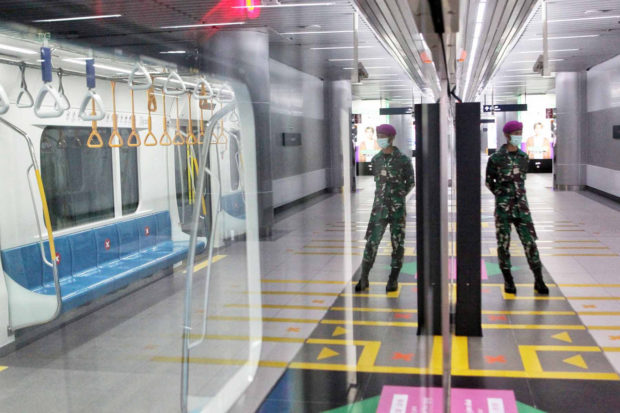
Soldiers stand guard at the MRT station in the Hotel Indonesia traffic circle in Jakarta. The Jakarta Post/Asia News Network/Seto Wardhana
JAKARTA — Indonesia’s first MRT service, MRT Jakarta, has called on its passengers to avoid having conversations while riding on its trains in a bid to break the chain of COVID-19 transmission on public transportation.
“As we all know, COVID-19 is transmitted through droplets that can come from infected people who cough, sneeze and talk,” said the management of MRT Jakarta on its official Instagram account @mrtjkt.
Therefore, besides requiring its passengers to wear masks, MRT Jakarta is also urging them not to engage in conversation while commuting, whether directly with other passengers or through phone calls.
“It [the policy] is being imposed to provide comfort for the passengers and maintain hygiene within the trains,” the caption of the post reads.
As the central government works toward adopting “new normal” measures to cope with the pandemic and to weather its severe economic impacts, the Transportation Ministry through the Greater Jakarta Transportation Agency (BPTJ) is formulating a detailed regulation on public transportation.
“The regulation for the new normal approach for public transportation is actually in place –Ministerial Regulation No. 9/2020 issued by the Health Ministry on large-scale social restrictions (PSBB). But the more specific regulation will be issued soon,” BPTJ managing director Edy Nursalam said last week.
Previously, the Jakarta administration issued a string of policies for public transportation operations during the COVID-19 pandemic, including cutting the operational hours of its city-owned services such as MRT Jakarta, LRT Jakarta and Transjakarta, as well as reducing the number of fleets for each of the services.
The administration also limited the number of passengers in each fleet, imposed physical distancing and conducted temperature checks for passengers.


